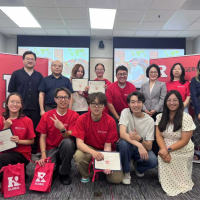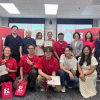
Upcoming Events
Please see below for our upcoming events.
Past Events
Scroll through our past events or filter by year.


While it is well-known that spillovers occur between workplaces and civic society, examinations are largely limited to employee voice effects on distal acts like voting. Spillovers between broader employment experiences and socio-politically extreme belief formation are less developed. We theorize that positive employment experiences reduce individual-level socio-politically extreme beliefs through control loss mitigation, anxiety reductions, and exposure to new perspectives. We also propose heterogeneous job empowerment effects.


We study the role of union heterogeneity in shaping wages and inequality among unionized workers. Using linked employer-employee data from Brazil and job moves across multi-firm unions, we estimate over 4,800 union-specific pay premia. Unions explain 3–4% of earnings variation. While unions raise wages on average, the standard deviation in union effects is large (6-7%). Validating our approach, wages fall in markets with higher vs. lower union premia following a nationwide right-to-work law. Linking premia to detailed data on union attributes, we find that unions with strike activity, collective bargaining agreements, internal competition, and skilled leaders secure higher wages. High-premium unions compress wage gaps by education while the average union exacerbates them. Post right-to-work, however, worker support for high-premium unions falls when between-group bargaining differentials are large. Our findings show that unions are not a monolith—their structure and actions shape their wage effects and, consequently, worker support.


The paper deals with the regulatory gaps that resulted in devastating and scandalizing wages and working conditions in the German meat industry for more than two decades.


This talk introduces an important theory in evolutionary biology: the r/K strategy theory.


Organizations increasingly use algorithms to determine who gets hired, how workers are evaluated, and even who gets fired. To examine the implications of organizations’ use of algorithms in the labor process, I conducted a longitudinal study of one the largest digital labor platforms for high-skilled work. I found workers were confronted with and responded to the algorithms controlling them in ways that existing theory does not adequately account for. First, new workers engaged in practices which inadvertently contributed to suboptimal wages and inefficient job matching when then they encountered the “cold start” problem: the algorithm struggled to recommend new workers to jobs primarily because they had no prior rating history. Second, for experienced workers who obtain a rating evaluation, the platform's algorithms create what I call "reputational interdependence": the platform's algorithms share workers' rating scores within and across other digital platforms and organizations, without workers' consent or control. Together, I theorize how algorithms enable platforms to control high-skilled workers within an “invisible cage”: an environment in which organizations embed the rules and guidelines for how workers should behave in opaque algorithms that shift without providing notice, explanation, or recourse for workers. It is ‘invisible’ because organizations can use algorithms to change the rules and criteria for success at an unprecedented speed and scale without notice or explanation. It is a ‘cage’ because these algorithms increasingly control our opportunities without our say.
The Center for Global Work and Employment (CGWE), Rutgers Global, and the TUP Academy (based in New Jersey, U.S.) partnered to launch TUP@Rutgers, an innovative non-degree, pre-college preparatory program for highly qualified international students.


The Center for Global Work and Employment (CGWE), in partnership with Rutgers Global, hosted the 5th Summer Camp, Frontiers of Labor and Human Resources Management, at Rutgers’ New Brunswick campus from July 28 to August 19, 2025. Nine students from Renmin University of China, Macau University of Science and Technology, and Korea University participated in the program.


CGWE co-organized the Global Labor Governance Forum: Knowledge, Institutions, and Practices for Sustainable Globalization with Renmin University’s School of Labor and Human Resources and the Beijing Office of the International Labour Organization (ILO). The forum took place in Beijing, China, on July 12, 2025, and drew more than 50 researchers and practitioners from the U.S., the U.K., China, and the ILO.
The Center for Global Work and Employment (CGWE) co-organized the conference Artificial Intelligence and the Future of Work: Theory, Policy, and Practice with the School of Public Administration of South China University of Technology, the India-Pakistan Center of South China University of Technology, the ESRC Centre for the Digital Future of Work, and the Guangdong Social Security Research Center. Held in Guangzhou, China, on July 4–5, 2025, the event brought together more than 50 researchers from the U.S., Canada, Australia, and China.


Together with the Productivity Network, the University of Newfoundland, the University of Alberta, Toronto Metropolitan University, and the Rutgers Network of Work-Studies Scholars, the Center for Global Work and Employment (CGWE) organized the international conference AI, Remote Work, and Productivity at Memorial University of Newfoundland, St. John’s, Canada, on May 8–9, 2025. More than 100 researchers, Canadian government officials, and practitioners participated. Rutgers professors Mingwei Liu (SMLR), Jennifer Hunt (Economics), and Yanhong Jin (Agricultural, Food, and Resource Economics) presented their research. The conference also featured a workshop for a forthcoming special issue of the Journal of Productivity Analysis on AI, remote work, and productivity.


